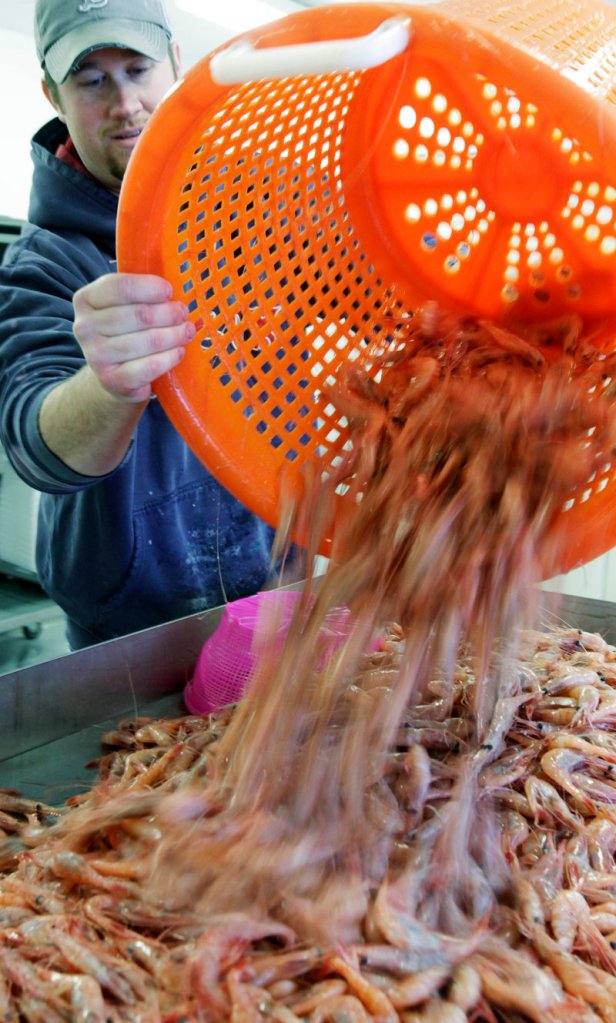The Gulf of Maine shrimp fishing season could be short, with the 2012 catch limited to a third of the 2011 harvest.
Shrimp fishermen have been given a catch limit of 4.4 million pounds for the upcoming season, down from the 13 million pounds they caught last season. The new season will begin Monday and end when the catch limit is reached.
Scientists say lower catch limits are needed because shrimp are being overfished and the supply is declining. But fishermen say their livelihoods are at stake, and processors are worried that markets they have built for Maine shrimp will be put at risk because they won’t have enough product to fill orders.
Fishermen are expecting decent prices, but there will be “dire economic consequences” with so little shrimp to go around, said Maggie Raymond, executive director of Associated Fisheries of Maine.
“I predict it’ll be a miracle if they get through the end of January” before reaching the limit, Raymond said. “I can’t see there being anything left in February.”
In the cold waters of the Gulf of Maine, northern shrimp provide a winter fishery for hundreds of New England fishermen. Boats from Maine typically catch about 90 percent of the annual harvest, with small numbers from New Hampshire and Massachusetts catching the rest.
The shrimp population varies, and regulators set limits each year on how much can be caught. The season was cut short in each of the past two years because fishermen surpassed the target, by 28 percent in 2010 and by 48 percent this year.
The Atlantic States Marine Fisheries Commission based this coming season’s lower catch on scientific surveys that showed a decline in the shrimp population. The catch limit was set despite objections by fishermen and processors.
Net fishermen will be allowed to fish only three days a week — Monday, Wednesday and Friday. Those who use traps to catch shrimp can’t do so until February, and will be limited to 1,000 pounds per day per boat, said Michael Waine, a fisheries management coordinator with the commission.
“The intent is to slow the shrimp harvest to spread out the landings to extend the season,” Waine said.
Fishery managers are also trying to keep closer tabs on the harvest. For the first time, shrimp dealers will be required to report numbers weekly, rather than monthly, so that regulators will know in a timely manner when the catch limits are being approached.
The fisheries commission’s shrimp panel will meet Jan. 19 to evaluate where the harvest stands and possibly modify or adopt new regulations — such as trip limits for net fishermen — to slow the catch rate even more if it’s deemed necessary.
Not everybody agrees that such a small catch limit is necessary, said John Norton, owner of Cozy Harbor Seafood in Portland.
Fishermen have been seeing an abundance of shrimp in the past couple of years, he said, and a group of processors is petitioning the commission’s shrimp panel to consider raising the catch limit when it meets Jan. 19. Another stock assessment formula suggests that fishermen could catch nearly 10 million pounds of shrimp this season without putting the stock at risk, he said.
The shrimp industry in Maine employs more than 1,500 people, from fishermen and workers who help unload boats to truck drivers and processors, he said. Cozy Harbor alone employs 130 to 140 workers during shrimp season to process and pack shrimp bound for New England, West Coast and European markets.
“I’m just astounded that with the economic conditions we have in this state and this country that we’re giving up those jobs and giving up those paychecks,” Norton said.
Many fishermen think now is the time for regulators to institute a system that restricts how many fishermen can get shrimp fishing licenses, based on their history of shrimp fishing.
Supporters say that controlling the number of boats in the fishery would help keep the shrimp population at sustainable levels. Opponents say a limited-entry system would shut many lobstermen and others out of the fishery and change the culture of fishermen by further limiting their ability to patch together a living when pickings are slim.
Regulators are now considering a limited-entry system.
Copy the Story Link
Send questions/comments to the editors.



Success. Please wait for the page to reload. If the page does not reload within 5 seconds, please refresh the page.
Enter your email and password to access comments.
Hi, to comment on stories you must . This profile is in addition to your subscription and website login.
Already have a commenting profile? .
Invalid username/password.
Please check your email to confirm and complete your registration.
Only subscribers are eligible to post comments. Please subscribe or login first for digital access. Here’s why.
Use the form below to reset your password. When you've submitted your account email, we will send an email with a reset code.